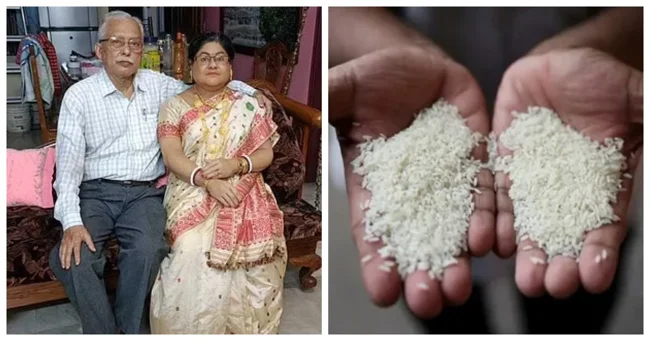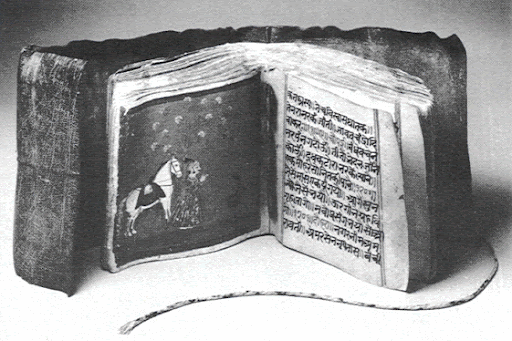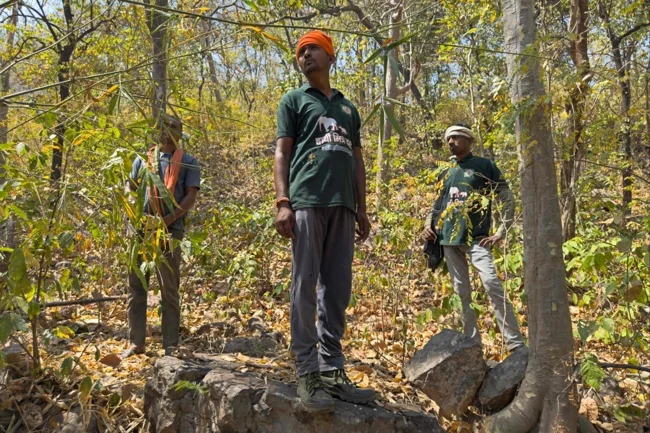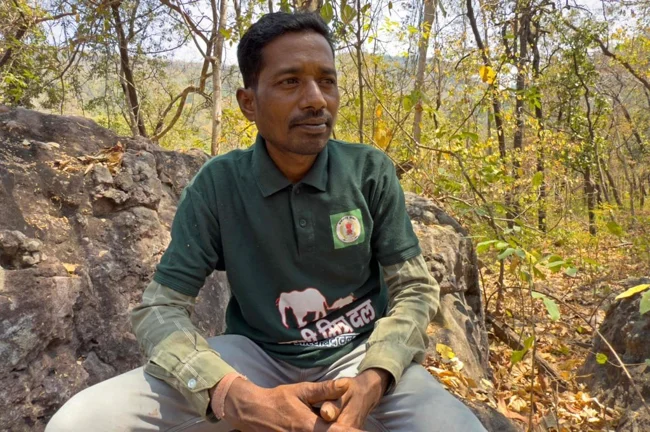From silicone memory to a rice detector: 3 incredible facts about India (10 photos)
India is not only a cultural phenomenon, but a country where ancient traditions intertwine with modern technology, creating sometimes shocking, but brilliant solutions. 
Here, sometimes they determine the guilt of thieves... by chewing rice, track elephants without GPS, and widowers order exact copies of their dead wives.
1. ‘Till death do us part’: Grieving Indian man orders silicone doll of his dead wife 
Tapas Sandilya, 65, a former civil servant, lost his wife Indrani during the COVID-19 pandemic. Now he takes care of her exact silicone replica, brushing her hair and making her sit in his favorite spot on the sofa.
Tapas and Indrani were married for 39 years, but in May 2021, she died of COVID-19 in a hospital while he was forced to stay at home in quarantine. During the second wave of the pandemic in India, the lockdown rules were especially strict, and the husband was not even able to say goodbye.
A year later, Tapas recalled their old conversation: they had once visited a temple where they saw an incredibly realistic statue of a deity. Then Indrani jokingly said: “If I die before you, make a statue of me like that.” 
And he fulfilled her request. The order for the creation of a silicone doll cost Tapas 250,000 rupees (£2,500). Sculptor Subimal Das, who never saw Indrani in life, worked from photographs and her husband's memories:
It was important for me to convey her facial expression. After all, we lived together for 39 years!
Now "Indrani" sits in the living room of their house in Kolkata - in that very favorite corner of the sofa. She is dressed in a silk sari that she wore to her son's wedding, adorned with gold jewelry. Tapas sometimes straightens her hair and even talks to her. Relatives did not approve of this idea at first, but he is sure: "Is this so different from the photographs on the shelf?" For him, this is not just a doll, but a way to feel his wife next to him again.
2. Rice Ordeal: Suspects in Ancient India Were Forced to Chew Rice to Determine Their Guilt or Innocence of Theft 
The rice ordeal is a divine method of establishing the truth that was used in Ancient India. This test involved suspects chewing rice grains and then spitting them out. The condition of the grains was used to determine guilt in the crime committed. The most amazing thing about this is that the effectiveness of this method has actually been proven, and a scientific explanation for this phenomenon has been found.
The ordeal by rice is mentioned in the Naradasmriti, which is part of the Dharmashastra, an ancient Indian legal and religious code. When Britain colonized India, the book was considered the law of the land for Hindus, and was therefore associated with Hindu law. However, this genre of literature dealt not only with legal issues, but also with other aspects, such as religion and ethics. It includes hundreds of texts, commentaries, and reviews.
The Naradasmriti describes seven types of ordeals, one of which is the ordeal by rice. The text states that it should be used only in cases of theft, and not in other categories of crimes. It also specifies that only white rice should be used, and no other grain. 
Before the trial, the judge had to purify himself. After that, he would place a grain of rice in a clay vessel in front of the image of the solar deity. The vessel would be filled with water, which had previously been used to wash the statue of the deity, and all of this would be left overnight.
The next day, the accused would be given these grains to chew. Before the trial, he had to wash himself and fast. During the trial itself, the accused had to look to the east and state the accusation himself. After the rice had been chewed, the suspect would spit the grains onto a leaf of a sacred fig tree. If such a leaf is not available, a birch leaf could be used instead.
The accused was found guilty if blood appeared on the grains, the gums began to bleed, or the body trembled during the ordeal.
A modern case of the rice ordeal 
Although the rice test dates back to ancient times, it was used even in later eras. This is evidenced by a case that took place in the 19th century. This incident is related to the theft of a gold watch from a man named George Christian, who lived in Calcutta. Four friends organized a domestic investigation, but were unable to identify the thief. The others suspected one of Christian's servants, but he himself rejected this possibility.
Then one of the clerks working with these people suggested contacting a "professor of magic" who served in the Calcutta police. This man specialized in catching thieves using the rice test. The procedure was carried out: the professor, together with the police, came to the house. However, instead of grains, rice flour was used, which was poured directly into the open mouths of the servants. They had to chew it and spit it out after five minutes onto a banana leaf.
This test allowed the crime to be solved. As expected, the innocent servants performed the procedure without any problems and spat out the flour within five minutes. Only one - Abdul, Christian's favorite servant, failed and was found guilty. He confessed to the theft and returned the watch to its owner. Abdul was then punished - he was given 20 blows with a stick, after which he returned to serve his master. 
The reason for the inability to spit out the flour was his nervous state. Knowing that he had committed theft, the boy was very nervous, worried that his crime would be discovered. Due to fear, his salivary glands did not secrete enough saliva to moisten the flour. This was proof of his guilt.
Scientists have found that fear causes the mouth to dry out because fear blocks the salivary glands. Although ancient Indians may not have known the exact physiological reason for this effect, they obviously noticed this phenomenon and specifically developed the rice test as a means of catching thieves.
3. Tracking dangerous giants without GPS 
Imagine: you are peacefully working in the field, and suddenly there is a stampede, the trees crackle, and an enraged elephant comes out to attack you and your crops. In India, such scenarios are not uncommon. To avoid tragedies, local residents use an unusual tracking system without chips and collars.
Due to deforestation, animals are increasingly coming to people: in 2015 alone, elephants killed 629 people. A solution was found. It was a mobile application that warns about the approach of a herd. 
The data for the application is collected by real trackers - teams of 4 people who wander through the forests, listening to the low-frequency sounds of elephants, looking for fresh tracks, droppings and even listen to the rumble of the herd's steps, mark the coordinates in the system - and the villages receive an SMS or a call if elephants are closer than 5 kilometers
It turned out that the main danger is not the herds, but the exiled loners. They are aggressive and unpredictable. Tracking them is more difficult because they do not follow the group's routes. 
As a result of the implementation of the system, an excellent result was obtained - 99% fewer victims.
Since February 2023, the system has worked almost perfectly - only 1 death against dozens before. Alerts are even sent through village loudspeakers. Trackers monetize their skills - some receive a salary for "elephant monitoring". While some countries spend millions on drones, India trusts human attention and old methods. And it works!
























